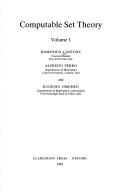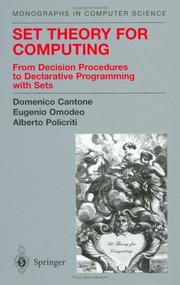| Listing 1 - 9 of 9 |
Sort by
|
Book
ISBN: 3319747789 3319747770 Year: 2018 Publisher: Cham : Springer International Publishing : Imprint: Springer,
Abstract | Keywords | Export | Availability | Bookmark
 Loading...
Loading...Choose an application
- Reference Manager
- EndNote
- RefWorks (Direct export to RefWorks)
This book presents an intuitive picture-oriented approach to the formative processes technique and to its applications. In the first part the authors introduce basic set-theoretic terminology and properties, the decision problem in set theory, and formative processes. The second part of the book is devoted to applications of the technique of formative processes to decision problems. All chapters contain exercises and the book is appropriate for researchers and graduate students in the area of computer science logic.
Set theory. --- Computable functions. --- Computer science. --- Mathematical logic. --- Computer Science. --- Mathematical Logic and Formal Languages. --- Mathematical Logic and Foundations. --- Computability theory --- Functions, Computable --- Partial recursive functions --- Recursive functions, Partial --- Constructive mathematics --- Decidability (Mathematical logic) --- Aggregates --- Classes (Mathematics) --- Ensembles (Mathematics) --- Mathematical sets --- Sets (Mathematics) --- Theory of sets --- Logic, Symbolic and mathematical --- Mathematics --- Logic, Symbolic and mathematical. --- Algebra of logic --- Logic, Universal --- Mathematical logic --- Symbolic and mathematical logic --- Symbolic logic --- Algebra, Abstract --- Metamathematics --- Set theory --- Syllogism --- Informatics --- Science
Digital
ISBN: 9783319747781 Year: 2018 Publisher: Cham Springer International Publishing
Abstract | Keywords | Export | Availability | Bookmark
 Loading...
Loading...Choose an application
- Reference Manager
- EndNote
- RefWorks (Direct export to RefWorks)
This book presents an intuitive picture-oriented approach to the formative processes technique and to its applications. In the first part the authors introduce basic set-theoretic terminology and properties, the decision problem in set theory, and formative processes. The second part of the book is devoted to applications of the technique of formative processes to decision problems. All chapters contain exercises and the book is appropriate for researchers and graduate students in the area of computer science logic.
Mathematical logic --- Computer science --- computers --- wiskunde --- logica --- computerkunde
Book
ISBN: 3031552482 Year: 2024 Publisher: Cham : Springer Nature Switzerland : Imprint: Springer,
Abstract | Keywords | Export | Availability | Bookmark
 Loading...
Loading...Choose an application
- Reference Manager
- EndNote
- RefWorks (Direct export to RefWorks)
Alfredo Ferro’s impact on information technology has traversed diverse domains, encompassing Computational Logic, Data Mining, Bioinformatics, and Complex Systems. After first studying Mathematics at the University of Catania, he received a Ph.D. in Computer Science from NYU in 1981, working under the supervision of Jacob Theodor (Jack) Schwartz. He returned to the University of Catania where he established the Computer Science undergraduate program, served as the coordinator of the Ph.D. program in Computer Science, cofounded the Ph.D. program in Biology, Human Genetics, and Bioinformatics, and retired as a full professor in 2021. Alfredo’s academic career as a computer scientist is characterized by two distinct research phases: Computational Logic until approximately 1995, followed by a notable focus on Data Mining and Bioinformatics. The contributions in this volume reflect the quality and the scope of his personal and collaborative successes. He also taught and inspired many excellent scientists. A pioneering initiative was to establish summer schools for Ph.D. students in 1989, leading to the so-called Lipari School, now the J.T. Schwartz International School for Scientific Research, where Alfredo continues to serve as director. This prestigious series includes schools focused on Computer Science, Complex Systems, and Computational Biology, featuring world-class scientists as lecturers and mentors.
Digital
ISBN: 9783031552489 9783031552472 9783031552496 Year: 2024 Publisher: Cham Springer Nature, Imprint: Springer
Abstract | Keywords | Export | Availability | Bookmark
 Loading...
Loading...Choose an application
- Reference Manager
- EndNote
- RefWorks (Direct export to RefWorks)
Mathematical logic --- Biomathematics. Biometry. Biostatistics --- Biological techniques --- bio-informatica --- biologie --- wiskunde --- logica

ISBN: 0198538073 Year: 1989 Publisher: Oxford : Clarendon press,
Abstract | Keywords | Export | Availability | Bookmark
 Loading...
Loading...Choose an application
- Reference Manager
- EndNote
- RefWorks (Direct export to RefWorks)
Computable functions. --- Set theory. --- Logique mathematique --- Calculabilite

ISBN: 0387951970 Year: 2001 Publisher: New York (N.Y.) : Springer,
Abstract | Keywords | Export | Availability | Bookmark
 Loading...
Loading...Choose an application
- Reference Manager
- EndNote
- RefWorks (Direct export to RefWorks)
Computable functions --- Set theory --- Computable functions. --- Set theory.
Book
ISBN: 0857298070 0857298089 Year: 2011 Publisher: London : Springer London : Imprint: Springer,
Abstract | Keywords | Export | Availability | Bookmark
 Loading...
Loading...Choose an application
- Reference Manager
- EndNote
- RefWorks (Direct export to RefWorks)
As computer software becomes more complex, the question of how its correctness can be assured grows ever more critical. Formal logic embodied in computer programs is an important part of the answer to this problem. This must-read text presents the pioneering work of the late Professor Jacob (Jack) T. Schwartz on computational logic and set theory and its application to proof verification techniques, culminating in the ÆtnaNova system, a prototype computer program designed to verify the correctness of mathematical proofs presented in the language of set theory. Taking a systematic approach, the book begins with a survey of traditional branches of logic before describing in detail the underlying design of the ÆtnaNova system. Major classical results on undecidability and unsolvability are then recast for this system. Readers do not require great knowledge of formal logic in order to follow the text, but a good understanding of standard programming techniques, and a familiarity with mathematical definitions and proofs reflecting the usual levels of rigor is assumed. Topics and features: With a Foreword by Dr. Martin Davis, Professor Emeritus of the Courant Institute of Mathematical Sciences, New York University Describes in depth how a specific first-order theory can be exploited to model and carry out reasoning in branches of computer science and mathematics Presents an unique system for automated proof verification on the large scale Integrates important proof-engineering issues, reflecting the goals of large-scale verifiers Includes an appendix showing formalized proofs of ordinals, of various properties of the transitive closure operation, of finite and transfinite induction principles, and of Zorn’s lemma This ground-breaking work is essential reading for researchers and advanced graduates of computer science.
Set theory --- Mathematics --- Engineering & Applied Sciences --- Physical Sciences & Mathematics --- Algebra --- Computer Science --- Information Technology --- Computer Science (Hardware & Networks) --- Set theory. --- Aggregates --- Classes (Mathematics) --- Ensembles (Mathematics) --- Mathematical sets --- Sets (Mathematics) --- Theory of sets --- Computer science. --- Computers. --- Mathematical logic. --- Computer Science. --- Computer Science, general. --- Computation by Abstract Devices. --- Mathematical Logic and Formal Languages. --- Logic, Symbolic and mathematical --- Informatics --- Science --- Algebra of logic --- Logic, Universal --- Mathematical logic --- Symbolic and mathematical logic --- Symbolic logic --- Algebra, Abstract --- Metamathematics --- Syllogism --- Automatic computers --- Automatic data processors --- Computer hardware --- Computing machines (Computers) --- Electronic brains --- Electronic calculating-machines --- Electronic computers --- Hardware, Computer --- Computer systems --- Cybernetics --- Machine theory --- Calculators --- Cyberspace --- Logic, Symbolic and mathematical.
Digital
ISBN: 9780857298089 Year: 2011 Publisher: London Springer London
Abstract | Keywords | Export | Availability | Bookmark
 Loading...
Loading...Choose an application
- Reference Manager
- EndNote
- RefWorks (Direct export to RefWorks)
Mathematical logic --- Computer science --- Computer. Automation --- informatica --- wiskunde
Book
ISBN: 9780857298089 Year: 2011 Publisher: London Springer London Imprint Springer
Abstract | Keywords | Export | Availability | Bookmark
 Loading...
Loading...Choose an application
- Reference Manager
- EndNote
- RefWorks (Direct export to RefWorks)
As computer software becomes more complex, the question of how its correctness can be assured grows ever more critical. Formal logic embodied in computer programs is an important part of the answer to this problem. This must-read text presents the pioneering work of the late Professor Jacob (Jack) T. Schwartz on computational logic and set theory and its application to proof verification techniques, culminating in the ÆtnaNova system, a prototype computer program designed to verify the correctness of mathematical proofs presented in the language of set theory. Taking a systematic approach, the book begins with a survey of traditional branches of logic before describing in detail the underlying design of the ÆtnaNova system. Major classical results on undecidability and unsolvability are then recast for this system. Readers do not require great knowledge of formal logic in order to follow the text, but a good understanding of standard programming techniques, and a familiarity with mathematical definitions and proofs reflecting the usual levels of rigor is assumed. Topics and features: With a Foreword by Dr. Martin Davis, Professor Emeritus of the Courant Institute of Mathematical Sciences, New York University Describes in depth how a specific first-order theory can be exploited to model and carry out reasoning in branches of computer science and mathematics Presents an unique system for automated proof verification on the large scale Integrates important proof-engineering issues, reflecting the goals of large-scale verifiers Includes an appendix showing formalized proofs of ordinals, of various properties of the transitive closure operation, of finite and transfinite induction principles, and of Zorn's lemma This ground-breaking work is essential reading for researchers and advanced graduates of computer science.
Mathematical logic --- Computer science --- Computer. Automation --- informatica --- wiskunde
| Listing 1 - 9 of 9 |
Sort by
|

 Search
Search Feedback
Feedback About UniCat
About UniCat  Help
Help News
News